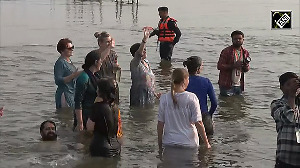 The government on Thursday approved the Integrated Action Plan for 60 selected tribal and backward districts across nine states for development of public infrastructure and services like school building, primary health centers, roads and electric lights.
The government on Thursday approved the Integrated Action Plan for 60 selected tribal and backward districts across nine states for development of public infrastructure and services like school building, primary health centers, roads and electric lights."The government has approved IAP for 60 selected tribal and backward districts for development of public infrastructure," an official statement said.
It said that the scheme would be an additional central assistance on a 100 per cent grant basis.
To begin with, IAP is proposed to be implemented with a block grant of Rs 25 crore (Rs 250 million) and Rs 30 crore (Rs 300 million) per district during 2010-11 and 2011-12, respectively.
Under the IAP, 15 districts would be covered in Orissa, followed by 14 tribal districts in Jharkhand and 10 districts of Chhattisgarh. Besides, the scheme would also cover eight districts of Madhya Pradesh and seven in Bihar.
Two districts each in Andhra Pradesh and Maharashtra will be covered under the scheme, whereas one district each of Uttar Pradesh and West Bengal would be covered.
Under the IAP, the funds will be placed at the disposal of the committee headed by the District Collector and consisting of the Superintendent of Police of the district and the District Forest Officer.
The district-level committee will have the flexibility to spend the amount on development schemes of their choice based on the need of the district.
The committee will draw up a plan consisting of concrete proposals for public infrastructure and services such as school buildings, anganwadi centres, primary health centres, drinking water
The Development Commissioner or equivalent officer in charge of development in the state will be responsible for scrutiny of expenditure and monitoring of the IAP.
Macro-level monitoring of the IAP will be carried out by the committee headed by the Member-Secretary, Planning Commission. Guidelines for the implementation of the IAP have been issued and the allocation of Rs 25 crore to each district for the year 2010-11 has been released to the state governments, the statement said adding that the districts have initiated action to start the implementation of the Scheme.
The experts also said that the final call on CBI's closure report will be taken only by the court as the victims' family members may also file the protest petition.
"Even though it is CBI's failure that it could not collect the evidence, it is now up to the court to accept or reject the closure report filed by the CBI.
"The court can also reject the closure report and ask the investigating agency to re-investigate the case.
"If there is something in the closure report or in the case diary which the court deemed to be fit for further probe, then it may ask the CBI to re-investigate it," Singh said.
Likewise, Kumar also opined that the Talwars may file the protest petition if they want the CBI to reinvestigate the case.








 © 2025
© 2025